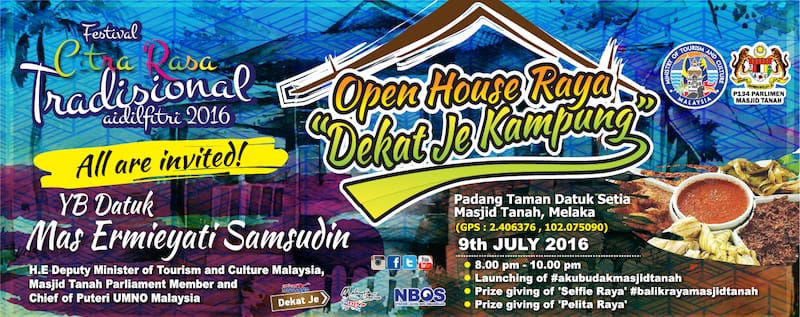MALAYSIA SAFE FOR JAPANESE HOLIDAY-MAKERS
A week after the unprecedented tidal wave incident in Peninsular
Malaysia, things are reported back to normal on the tourism front.
Malaysia remains a safe destination for tourists as the country was
spared the worst of the tsunami compared to other affected countries.
Malaysia was sheltered by the island of Sumatra and was not directly
exposed to the onslaught of the tidal waves.
According to the Honourable Datuk Dr. Leo Michael Toyad,
Malaysia's Tourism Minister, life in Penang is back to normal. It's
business as usual and tourists are up and about enjoying their
vacation. He said this at a media conference soon after he had made
a site inspection to the area affected by tsunami, to get a first hand
brief on the current situation in Penang on 29 December 2004.
Following his inspection of Langkawi island on 3 January 2005, the
Minister was satisfied that the conditions on the island were secure
for the ASEAN Tourism Forum to take place on the island as
scheduled from 21 until 29 January.
Yoichi Miyoshi, Sales Director for Japan market at Borneo Eco Tours,
hopes that the Japanese will not be deterred by the tsunami incident.
Having resided in Malaysia since 1983, Miyoshi appeals to all that
"Malaysia is a very safe country for tourism." He served as an
international cooperation volunteer on environment protection under
the Japanese NGO, Organisation of Industrial, Spiritual and Cultural
Advancement (OISCA), and stated that "the occurrence of
earthquake is very rare in Malaysia."
A common sentiment among the Japanese tour operators surveyed
in Malaysia is that it is safe to travel in Malaysia.
Melrose Travel & Tours Sdn Bhd director, Ismail Abdullah, says,
"Business has started to pick up." He has received many enquiries
from overseas clients about the situation in Langkawi. "My reply is
simple. Langkawi is safe," he said.
Executive Director of the Malaysian Association of Hotel Owners
(MAHO), Shaharuddin M. Saaid, said, "We would like to assure
tourists that there is nothing to worry or fear in terms of health, safety
and service. The basic infrastructure of tourism was not affected. The
tourist attractions were not affected. It is business as usual in
Malaysia. I wish to encourage tourists especially from Japan and
Korea to keep on coming. If you have any concerns, please check
with the embassies in your country to dispel any fears."
Newspapers report that tourists are still flocking in to the islands of
Langkawi and Penang despite the tsunami incident, a positive
indication that tourists have confidence in Malaysia's safety.
The Malaysian Government has taken swift action since the tsunami
incident.
· The authorities are diligently monitoring the coastal areas and
taking the necessary action needed to secure and maintain
control of the situation.
· Despite some minor damage in Penang and Langkawi, two
popular winter destinations, hotel operations there have
returned to normal and all is calm.
· Hotels have also reported that precautionary measures are
already in place and ready to be executed at any time.
· All sea, rail and road gateways and airports are open as usual.
· Malaysia Airlines' flights are operating as scheduled and there
has been no cancellation of flights to Malaysia.
· Hotel occupancy is above 75% in Penang and Langkawi.
· Tourist attractions in Penang and Langkawi are not affected.
In response to the tragedy, humanitarian and financial aid continue to
be channeled to the affected families and individuals. Donation drives
to help the families of the tsunami victims have been set up by
several parties: the Malaysian government, local newspaper
publications and other NGOs. The National Disaster Management
and Relief Committee (Federal, State and District levels), State
Tourism Action Council members, the Malaysian Association of Tours
and Travel Agents (MATTA), Malaysian Association of Hotels,
Malaysia Airlines (MAS) and all other organizations and individuals
have all come forward to assist in rescue, relief and recovery efforts
in the affected areas.
Malaysia is the ideal tourist destination for Japanese as the country
caters to the market extensively. There is an abundance of Japanese
restaurants with fresh seafood in the capital city of Kuala Lumpur.
Japanese films are often screened on the international screens of
certain cinemas and also at the Malaysia Tourism Centre (MTC) at
Jalan Ampang. For shopping, Japanese tourists will find that Isetan
and Jusco are popular stores in Malaysia. The Japan chain of hotels,
Nikko, is also in Malaysia to cater to the market.
Malaysia Airlines operates 27 flights a week to Malaysia. Japan
Airlines also flies to Malaysia 14 times a week.
Tourist arrivals from Japan for the period of Jan-Nov2003 was at
188,272 and increased to 279,234 for the same period in 2004, a
positive growth of almost 50%.
For more updates, please log on to our website: www.tourism.gov.my
Issued by: Communications Division, Tourism Malaysia
Date: 6 January, 2005
Contact: Tel: (603) 2615 8188
Email: enquiries@tourism.gov.my
__________________________________________

 View Previous
View Previous

